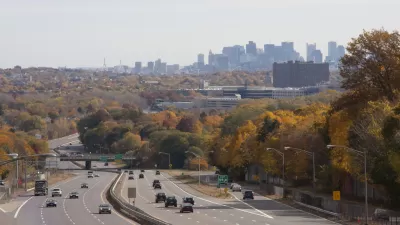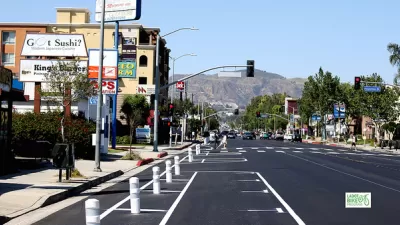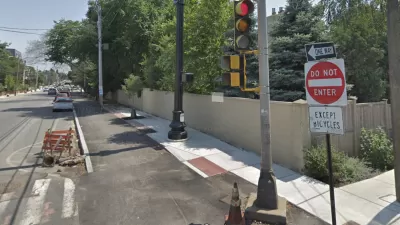The new guidelines call for pedestrian and bike infrastructure as part of the design of new state-run projects.

In an effort to prioritize pedestrians in major transportation projects, a new set of engineering guidelines from the Massachusetts Department of Transportation (MassDOT) "will require traffic engineers to include sidewalks, crosswalks, bus stops, and high-quality bike facilities when they design upgrades for the Commonwealth’s major roadways." As reported by Christian MilNeil for Streetsblog Massachusetts, the new controlling criteria call for "ADA-accessible pedestrian facilities and high-quality bikeways in state-run road reconstruction projects, plus bus shelters, crosswalks, and transit-priority infrastructure on road projects that affect major transit routes."
The policy seeks to act on MassDOT's 2013 Healthy Transportation Policy, which stated that "all MassDOT funded and or designed projects shall seek to increase and encourage more pedestrian, bicycle and transit trips." Under the new guidelines, "engineers can still request exceptions to the criteria when unusual constraints exist. But those exceptions will need to be thoroughly vetted in a public 'Design Justification Workbook,' and they’ll also need to be formally approved by the Secretary of Transportation."
MassDOT Chief Engineer Patricia Leavenworth says projects must still balance effective use of space with funding and local constraints. "It’s kind of like a household budget, where you have your list of things you want but you don’t have all the money you need, so you figure out how to compromise to get the things you really need."
FULL STORY: New ‘Controlling Criteria’ Will Require Sidewalks, Bike Lanes In State Road Projects

Maui's Vacation Rental Debate Turns Ugly
Verbal attacks, misinformation campaigns and fistfights plague a high-stakes debate to convert thousands of vacation rentals into long-term housing.

Planetizen Federal Action Tracker
A weekly monitor of how Trump’s orders and actions are impacting planners and planning in America.

San Francisco Suspends Traffic Calming Amidst Record Deaths
Citing “a challenging fiscal landscape,” the city will cease the program on the heels of 42 traffic deaths, including 24 pedestrians.

Defunct Pittsburgh Power Plant to Become Residential Tower
A decommissioned steam heat plant will be redeveloped into almost 100 affordable housing units.

Trump Prompts Restructuring of Transportation Research Board in “Unprecedented Overreach”
The TRB has eliminated more than half of its committees including those focused on climate, equity, and cities.

Amtrak Rolls Out New Orleans to Alabama “Mardi Gras” Train
The new service will operate morning and evening departures between Mobile and New Orleans.
Urban Design for Planners 1: Software Tools
This six-course series explores essential urban design concepts using open source software and equips planners with the tools they need to participate fully in the urban design process.
Planning for Universal Design
Learn the tools for implementing Universal Design in planning regulations.
Heyer Gruel & Associates PA
JM Goldson LLC
Custer County Colorado
City of Camden Redevelopment Agency
City of Astoria
Transportation Research & Education Center (TREC) at Portland State University
Jefferson Parish Government
Camden Redevelopment Agency
City of Claremont





























